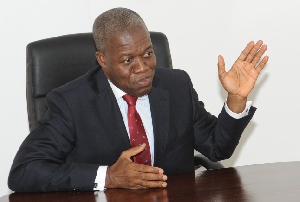Regional News of Friday, 28 August 2015
Source: GNA
Veep seeks software application for national security
Vice President Kwesi Amissah-Arthur has called on manufacturers of technology systems to grant state security forces the requisite advantage over software applications to deal with emerging security threats posed by terrorists and insurgents.
The provision of timely and relevant information to security forces, he said, formed the basis for successful operation and conduct of conflict to create peaceful and stable environment for the citizenry.
“As security practitioners, and manufacturers of information and communications systems, you must in developing software applications, examine the extent to which you can offer state security forces the required advantage to ensure peace and create a safer world,” he added.
Vice President Amissah-Arthur said this at the on-going 2015 Command, Control, Communications, Computers, Intelligence, Surveillance, Reconnaissance (C4ISR) and African Homeland Security Conference and Exhibition, hosted by the Ghana Army.
He noted that in the 21st century, even powerful nations found it extremely difficult to contain terrorists due to the global information age that had created opportunity for tiny enemies to enhance their disruptive capabilities by utilizing the power of ICT.
He said the emphasis placed on operations rather than war required more flexible non-traditional organizational structures like the volume of information generated that could be processed and disseminated swiftly to boost command and control.
He said the dangers by terrorists and insurgents had made it essential for nation-states to share experiences so that they could identify the right policies and integrate systems to achieve success without burdening national budgets.
Major-General R. Opoku-Adusei, Chief of the Army Staff, observed that modern economies lived in a state of insecurity largely driven by huge population growth, unemployment and inequality.
“We live in an age of uncertainty, everywhere, the status quo is being challenged, and the assumptions made in the past to shape our views of global security have been called into question,” he said.
Major-General Opoku-Adusei said trends in cyber security and the spread of uprisings triggered by the desire for greater say in governance, rendered it necessary for security managers to be more innovative in predicting insecurity.
“Indeed, the 21st century security challenges such as drug trafficking, organised crime, human trafficking and terrorism…demand a new approach to security operations,” he said.
He noted that the information technology sector was a critical partner in confronting threats posed by the digital economy, saying, “our adversaries equally employ ICT to disable the platforms provided for national economic survival.”











